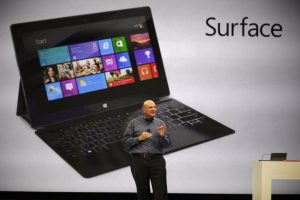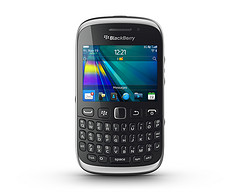Microsoft’s (MSFT) newly announced Surface tablet computer represents a daring move by the software maker into the mobile computer market now dominated by the Apple (AAPL) iPad franchise. The gadget has won generally positive initial reviews for its ultra-thin design, widescreen HD display and a pressure sensitive cover that doubles as a keyboard.
The Surface hardware and software were both made by Microsoft in-house, a big departure strategically for a company that has made a nice living licensing is various operating systems and software products to others. Yet it is necessary move for the company, according to Dan Frommer in a great post at SplatF. For Microsoft, notes Frommer, the most compelling model in today’s mobile industry — tablets and smartphones — is to sell the actual hardware to consumers, not just license out its operating system. But even that, as Jason Kottke shows, is merely a piece of the puzzle toward building a legitimate iPad competitor.
A skeptical view comes courtesy of Barry Randall of Crabtree Asset Management, who manages Covestor’s Crabtree Technology model – which, notably, does not hold Microsoft stock. Here’s Barry’s take:
Microsoft’s Surface tablet is saddled with an awful burden: Microsoft. The company’s devotion to client-based software in general and its Windows/Office franchise in particular makes me suspect that they may not fully understand the tablet space, circa 2012.
In its favor, the forthcoming Windows 8 has been revealed to be a quantum leap forward in usability and in presenting a web- and app-focused platform, mimicking much of the appeal of the iPad and iPhone. At least one of the forthcoming Surface tablets will run Windows 8. Other aspects (screen, keyboard) of the Surface seem to be at least state-of-the-art.
But Microsoft has a lot of catching up to do in presenting a full and seamless ecosystem (e.g. iTunes, 225,000 apps), at a price low enough to attract marginal customers. No one expects the Surface experience to blow away prospective customers – it’s all about being good enough at a low enough price. And then understanding that further success will not be “release-driven” but will be “web-driven.”
And it doesn’t bode well when the larger world views Microsoft’s other non-traditional battles (e.g. xBox) as being victories (sold more units cumulatively than PlayStation) when in fact they’re business failures (cumulative losses of $5.5 billion since xBox’s first release 10 years ago).
Microsoft couldn’t ignore the tablet phenomenon any longer. But success of Surface will hinder less on the specifics of the product and more on Microsoft’s ability to suppress the worst impulses in its corporate DNA. It certainly doesn’t change our view of Microsoft as an investment: continuing to lose share, inter-galactically bad returns on R&D spending, and trapped by its own addiction to a PC-centric worldview.
But for Covestor manager Patrick Larkin, who manages the All Cap Value model and owns Microsoft (as of 6/20), software is still the main event at Microsoft:
Don’t pay any attention to chatter about the Surface or any other new product reducing margins. Precious few new products will have margins comparable to Microsoft’s core software franchises. What matters is return on investment, not margins. Any new business initiative that earns a return above the firm’s cost of capital increases the intrinsic value of the stock, regardless of the effect on margins. This is business finance 101.
At a minimum, the Surface protects Microsoft’s dominance in the enterprise market by providing an attractive windows-based tablet option. I don’t think that Surface will supplant the iPad in terms of profitability in the consumer market, but if the device can be profitably offered at an attractive price point it could garner a large market share in this growing market. Apple might well cede this market segment rather than cutting their own prices or watering down the iPad brand with lower-end offerings.
Microsoft is one of the most popular holdings among Covestor managers. Check out what others think of the company’s prospects.




